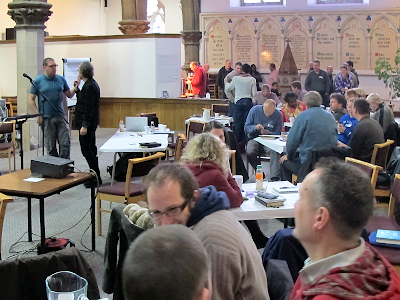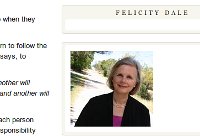For some weeks now, Roger and I have been meeting to work through the 'Freedom in Christ' (FIC) course together. This is the British version of the course originally developed in the USA by Neil Anderson. You can also view the US website or the international page.
The course is not affiliated to a particular denomination in any way. It consists of a series of DVD presentations and a small book, the 'Participant's Guide'.
According to the back cover of the guide, the objective of the course is 'To help every Christian become a fruitful disciple*.'
Roger has been through the material several times already so he is leading and guiding the process. I'm a newbie. We're about half way through the material which is sound, helpful, and well produced. I'd recommend it to anyone. Although Roger and I are working as a twosome, FIC is often presented to a group, just like the sessions on the DVDs.
Here are the session headings together with brief content; each of the thirteen sessions is designed to take a week, perhaps an hour together and then whatever time you feel you need on your own.
If you want to get a feel for the style you can try the free sample material offered on the website.
The sessions - These fall into an introduction and four parts, listed below.
0 - Introduction - The reason for the course, content, reliability of the Bible, church growth.
Part A - Key truths
1 - Where did I come from? - Spiritual life and death, the fall, Jesus' mission, acceptance.
2 - Who am I now? - Saint or sinner, forgiven and new, already pleasing to the Lord.
3 - Choosing to believe the truth - Faith and belief, growing in faith, trouble, action.
Part B - The world, the flesh and the devil
4 - The world's view of truth - Understanding the world, worldviews, the Bible.
5 - Our daily choice - Flesh and sin not gone, natural, spiritual, fleshly, choosing.
6 - Demolishing strongholds - Nature and effect of strongholds, demolition.
7 - The battle for our minds - Satan and how he works, our resources, the light.
Part C - Breaking the hold of the past
8 - Handling emotions well - Feelings and belief, handling emotion, past trauma.
9 - Forgiving from the heart - Forgiving and freedom, from the heart, not forgetting.
Part D - Growing as disciples
10 - Walking in freedom every day - Keys to maturity, dealing with lies, good and evil.
11 - Relating to others - Grace, responsibility, awareness, discipline, authority.
12 - Where are you heading? - Feelings, responses, goals, difficulties, love.
13 - Staying on the right path - Live, believe, goals, time, fulfillment, serving.
Week by week - Each of the numbered sessions above comes with a DVD presentation and a chapter in the guidebook. The sessions are exploratory and explanatory and have pauses for thought that require action to restart the DVD each time. This means there's always enough time to deal with questions as necessary.
Feedback from the studio audience is helpful as are brief interviews with people saying what they found particularly useful.
Having completed Parts A and B so far, I think it's fair to say there's been nothing that is new to me, but several times an idea has been presented in a new way or seen in a new light. It does cover everything systematically so will fill any gaps in understanding that people might have.
Conclusions - Freedom in Christ is sound and likely to be useful to any follower of the Way of Jesus. It might be particularly helpful to newer believers (for example, those who have completed an Alpha Course, have faith in Christ and want to go further). But it will also be valuable as a check-up and reminder for those who, like me, have been on the journey a long time.
It is also worth considering for anyone who is not yet convinced about faith but is seriously interested. This is not its intended purpose, but thinking everything through systematically, as it does, could make all the difference for some.
(*Freedom in Christ uses the term 'disciple' in a different way than is normal on this blog. Rather than the sense of a person who follows Jesus into the harvest to make disciples, FIC uses the word to mean a person with maturity in Christ. The two are not incompatible, but they are not quite the same thing.)
Questions:
- Do you think a structured course like this could help you in your personal journey?
- What advantages can you see to a structured and tested course like this?
- Do you foresee any disadvantages or dangers here?
- Do you have friends that might benefit from Freedom in Christ?
See also:
- Alpha course
- Freedom in Christ (UK)
- Fruit of our lives - Journeys of heart and mind
- Groups of six to twenty - Journeys of heart and mind
- Groups of two or three - Journeys of heart and mind
- Spiritual parents - Simply church








